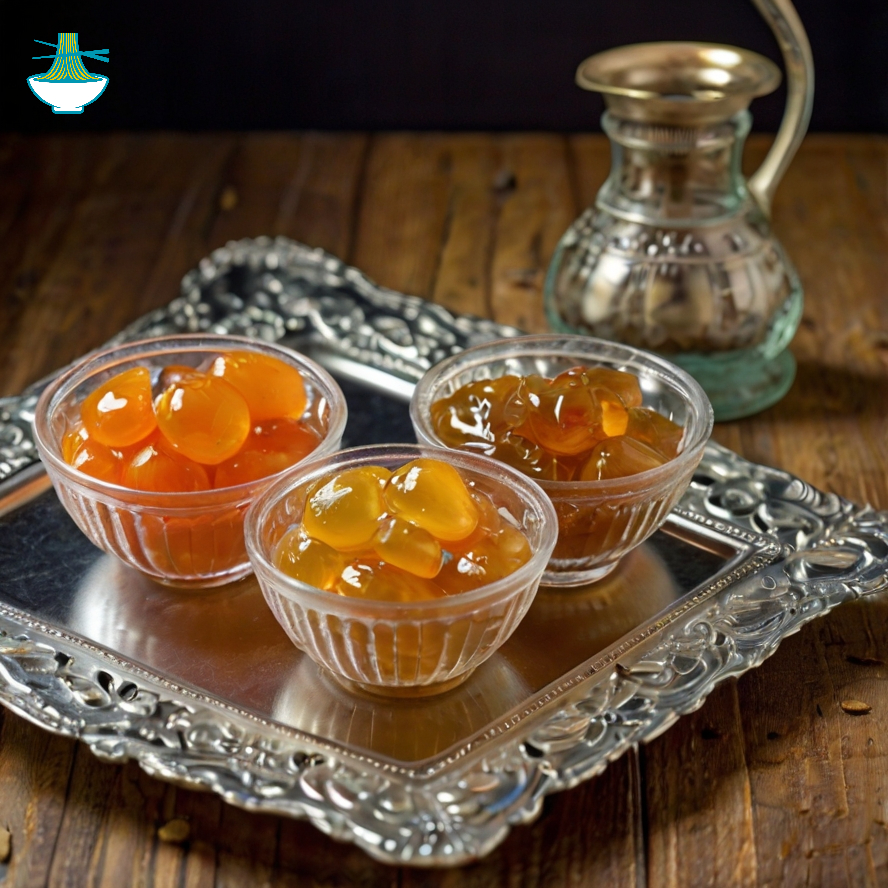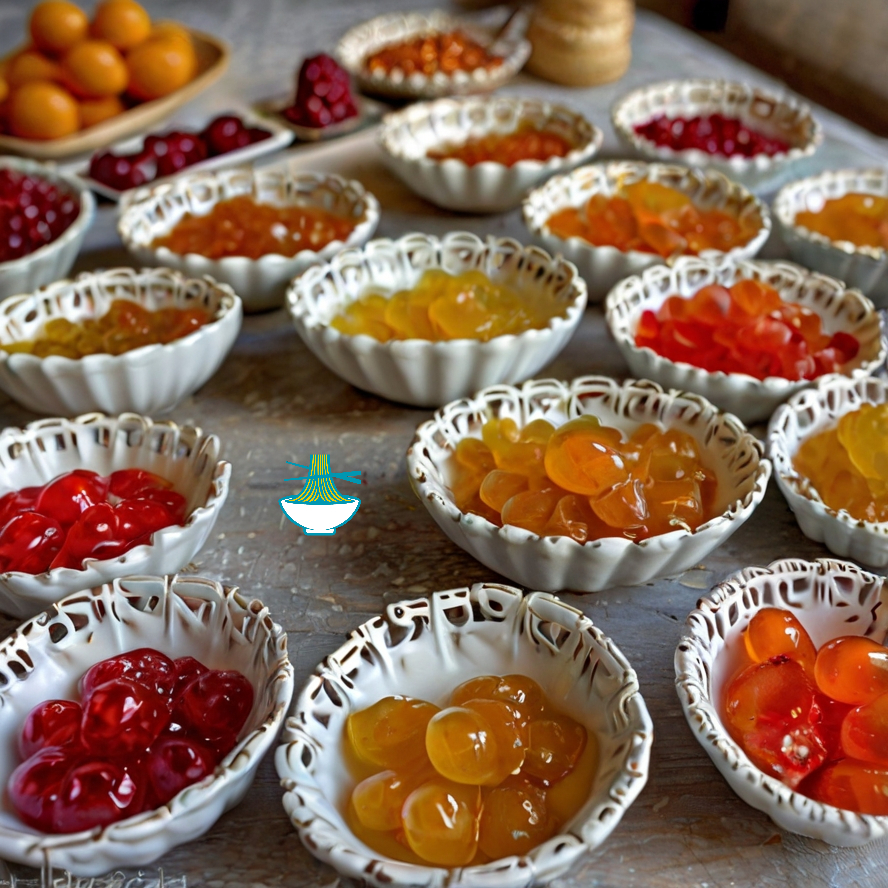Cyprus Glika Tou Koutaliou, meaning "spoon sweets" in Greek, is a traditional Cypriot preserve made from fresh fruit, sugar, and optional spices or nuts. This beloved Cypriot treat is typically served in small spoonfuls as a dessert or a gesture of hospitality. Known for its sweet, syrupy consistency, it pairs wonderfully with Greek coffee or tea and is often given as a thoughtful gift during holidays and special occasions.

Cyprus Glika Tou Koutaliou has deep roots in Cypriot culture, reflecting the island's rich agricultural heritage and emphasis on hospitality. The art of making these preserves is passed down through generations, symbolizing both the Cypriot tradition of using locally grown fruit and the importance of welcoming guests with a sweet, homemade treat. The practice of presenting these spoon sweets dates back centuries, and they continue to be a cherished part of Cypriot celebrations and everyday life.
Ingredients:
- 1 kg fruit (common choices include figs, apricots, cherries, or grapes)
- 1 kg sugar
- 1 cup water
- Juice of one lemon
- Optional: cinnamon sticks, cloves, or nuts for added flavor
Instructions:
1. Prepare the Fruit: Wash, dry, and, if necessary, cut the fruit into small pieces. Remove any stems, seeds, or pits.
2. Combine Ingredients: In a large pot, mix the fruit, sugar, and water. Add optional spices or nuts if desired.
3. Cook: Heat the mixture over medium heat until the sugar is fully dissolved, stirring occasionally.
4. Simmer: Once the sugar has dissolved, add lemon juice. Reduce heat to low and simmer for 45 minutes to 1 hour, until the fruit is tender and the syrup has thickened.
5. Cool and Store: Remove any spices or nuts. Allow the mixture to cool to room temperature, then spoon into sterilized jars. Seal tightly and store in a cool, dry place.
Notes:
- Ensure jars are properly sterilized to prevent spoilage. Wash them with hot, soapy water, rinse well, and let them air dry completely before use.

Nutrition Value:
1. 1 kg fruit (common choices include figs, apricots, cherries, or grapes):
- Calories: Varies by fruit, but typically 40-80 calories per 100 grams.
- Carbohydrates: About 10-20 grams per 100 grams.
- Protein: Approximately 0.5-1 gram per 100 grams.
- Fat: Less than 0.5 grams per 100 grams.
- Sodium: Minimal, around 1-5 mg per 100 grams.
- Cholesterol: None.
- Vitamins: Rich in vitamin C, vitamin A (particularly in apricots), and some B vitamins.
- Minerals: Provides potassium, magnesium, and small amounts of calcium and iron.
- Nutritional Benefits: Fruits are high in dietary fiber, antioxidants, and vitamins, which support overall health, boost the immune system, and aid digestion.
2. 1 kg sugar:
- Calories: About 4,000 calories.
- Carbohydrates: 1,000 grams.
- Protein: None.
- Fat: None.
- Sodium: Minimal, around 0 mg.
- Cholesterol: None.
- Vitamins: None.
- Minerals: Minimal, with negligible amounts of minerals.
- Nutritional Benefits: Provides energy but lacks essential nutrients. Excessive consumption can lead to weight gain and health issues.
3. 1 cup water:
- Calories: 0 calories.
- Carbohydrates: 0 grams.
- Protein: 0 grams.
- Fat: 0 grams.
- Sodium: 0 mg.
- Cholesterol: None.
- Vitamins: None.
- Minerals: None.
- Nutritional Benefits: Essential for hydration, supports bodily functions, and maintains overall health.
4. Juice of one lemon:
- Calories: About 12 calories per lemon.
- Carbohydrates: 4 grams.
- Protein: Less than 1 gram.
- Fat: Less than 0.1 gram.
- Sodium: About 1 mg.
- Cholesterol: None.
- Vitamins: High in vitamin C, which boosts the immune system and has antioxidant properties.
- Minerals: Contains small amounts of potassium and magnesium.
- Nutritional Benefits: Provides vitamin C, supports immune function, and adds tangy flavor.
5. Optional: cinnamon sticks, cloves, or nuts for added flavor:
- Cinnamon Sticks:
- Calories: About 6 calories per stick.
- Carbohydrates: 2 grams.
- Protein: Less than 1 gram.
- Fat: Less than 0.1 gram.
- Sodium: Minimal, around 1 mg.
- Cholesterol: None.
- Vitamins: Contains small amounts of vitamin K.
- Minerals: Provides manganese, calcium, and iron.
- Nutritional Benefits: Has antioxidant and anti-inflammatory properties, supports metabolism, and adds warm flavor.
- Cloves:
- Calories: About 6 calories per clove.
- Carbohydrates: 1.5 grams.
- Protein: Less than 1 gram.
- Fat: Less than 0.1 gram.
- Sodium: Minimal, around 0 mg.
- Cholesterol: None.
- Vitamins: Rich in vitamin C.
- Minerals: Contains manganese, calcium, and iron.
- Nutritional Benefits: Offers antioxidant and anti-inflammatory properties and may aid in digestion.
- Nuts:
- Calories: Varies by type, generally around 600 calories per 100 grams.
- Carbohydrates: About 15-20 grams.
- Protein: Approximately 15-25 grams.
- Fat: Around 50-60 grams, primarily healthy fats.
- Sodium: Minimal, around 0-10 mg per 100 grams.
- Cholesterol: None.
- Vitamins: Rich in vitamin E and some B vitamins.
- Minerals: High in magnesium, potassium, and calcium.
- Nutritional Benefits: Good source of healthy fats, protein, and nutrients that support heart health and overall well-being.


Comments